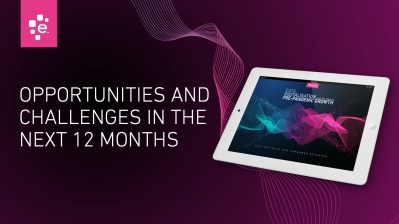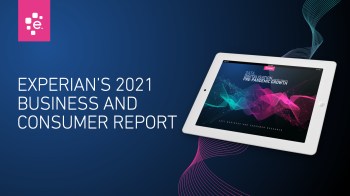Consumers generally trust banks with their data, but their needs and expectations have changed during the pandemic and this has accelerated the digital transformation process.
“The crisis reflects on the data we are dealing with and since the data is the most valuable asset to perform risk management, we all depend on the data – its nature, structure and storage. Dealing with stable data is not that big a challenge but innovations are what help us to deal with unstable, not well-structured, missing or biased data. The challenge comes not only as a result of the crisis but also as a result of the expanding banking products and systems during the banking process. That is why we are willing to expand the data sources, improve data quality and take as much possible advantage of the data by using more innovations”, said Tsveta Nikolova, Head of Credit Risk Methodology and Capital Adequacy Control Department at Postbank.
The report shows that 62% of businesses have seen an increase or a significant increase in credit applications from new customers over the past 12 months. Organisations that still suffer from delays due to manual workarounds or customer checks that slow the process down will be affected and lose business. Organizations are now trying to create a digital customer journey as smooth, easy and transparent as possible.
The data shows that 67% of businesses are prioritising investment in the digitalisation of core business processes. “Early Warning System allowed us to defend our portfolio from deterioration and maintain a good customer relationship even during the collection process” – confirmed Natalia Keserova, Head of Retail Troubled Assets Group Department at Postbank
During the last two years the pandemic has made it more difficult to understand the true picture of the financial health of consumers and sole proprietors and on the other hand, has accelerated the digital transformation and introduced new ways for consumers to use financial services. The mass spreading of internet use and online shopping and interaction has paved the way for a new, disruptive trend in banking services, which are embarking on a fully-mobile journey.
transformation and introduced new ways for consumers to use financial services. The mass spreading of internet use and online shopping and interaction has paved the way for a new, disruptive trend in banking services, which are embarking on a fully-mobile journey.
According to key managers of fintech and mobile banks speaking during the Experian Innovation Week, disruptive mobile banking is already seizing chunks of market share from traditional banks.
For example, The UniCredit Group has launched buddybank, currently available for Italian customers only, a mobile-only bank accessible solely via smartphone, available on iOS, Android and recently on Huawei platforms. According to Massimo Bondanza, head of marketing & products at buddybank, mobile banking – “allows the use of small formats, due to the use of smartphones for interaction, instead of desktops. We also had to eliminate all round trips outside the smartphone. It all starts and ends within the mobile phone”. Buddybank is using Experian solutions, and this allowed fast deployment, without branches – the mobile-only bank runs its customer care through chat and is completely paperless.
For the business environment, and SMEs especially, mobile banking is useful since it allows clearance for loans within 48 hours.
The use of algorithms has taken mobile banking to an unprecedented level, leading Ivo Grigorov – CEO of Credefi Ltd, to estimate that there were 300 billion alternative online transactions (outside traditional banking) worldwide last year, with that figure predicted to double by 2026. “Our aim is to bridge the traditional financial sector and the blockchain ones and thus to provide a rather unique service. We believe that such bridge is the future of finance. We offer our customers very easy access to finance by employing blockchain technology. We offer services that have very low transactional fees compared to traditional finance. The two main advantages are the cost and time effectiveness as well as an easy and customer friendly experience. The whole process from the application all the way to the disbursement of funds is done on the platform and is digitalised.”, said Ivo Grigorov, CEO of Credefi Ltd.
Open Banking is clearly a game changer for financial institution around the globe, including the CEE region. It is providing an opportunity to better evaluate risks and also for tailormade product propositions for different customer lifestyles. The innovative elements are the efficiency and transparency that can smooth the customer journey. It is also servicing the connectivity challenges and secure business continuity model as stability becomes the key factor for a smooth user experience.
Michal Lukasik, CEO of Kontomatik, a bank reader licensed fintech, said that: “even if the levels of maturity in EMEA vary from country to country and from vertical to vertical, in the near future we can expect Open Banking solutions to become more and more widespread. The challenge from a technical point of view is represented by the stability and quality of data. In EMEA there are in fact many different technical standards. It is crucial to have a good categorisation process that can harmonize data from different data sources and make them meaningful.”
ABOUT EXPERIAN
Experian is the world’s leading global information services company. During life’s big moments — from buying a home or a car to sending a child to college to growing a business by connecting with new customers — we empower consumers and our clients to manage their data with confidence. We help individuals to take financial control and access financial services, businesses to make smarter decisions and thrive, lenders to lend more responsibly, and organizations to prevent identity fraud and crime.
We have 17,800 people operating across 45 countries, and every day we’re investing in new technologies, talented people and innovation to help all our clients maximize every opportunity. We are listed on the London Stock Exchange (EXPN) and are a constituent of the FTSE 100 Index.
Learn more at www.experianplc.com or visit our global content hub at our global news blog for the latest news and insights from the Group.

